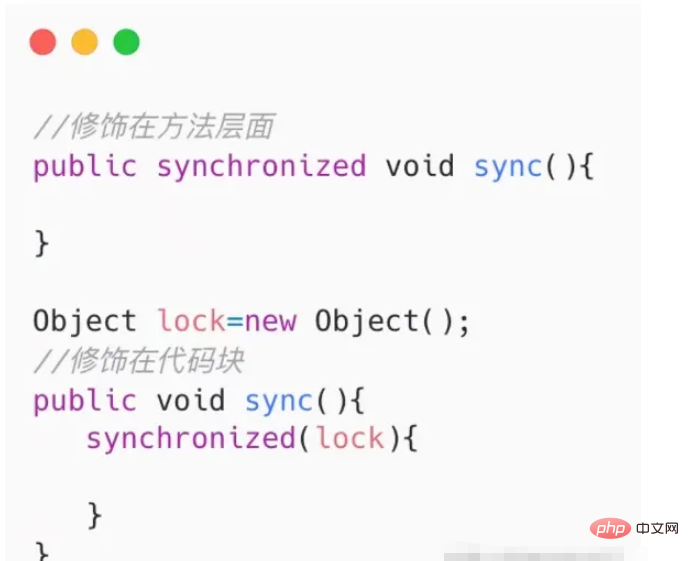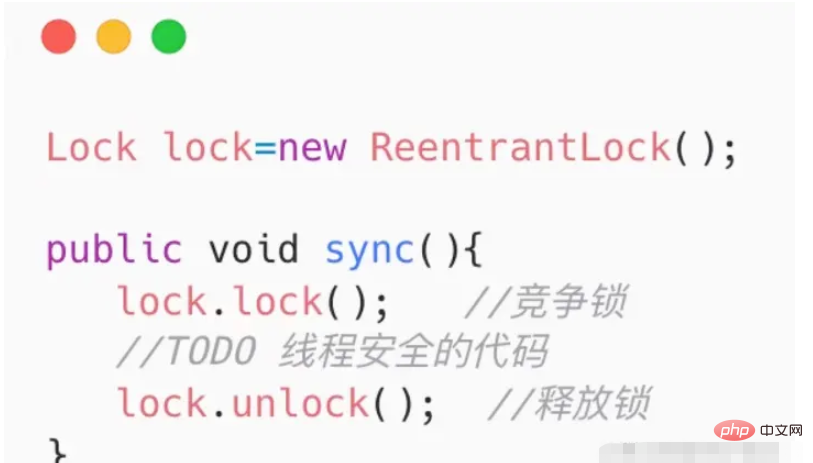What is the difference between Lock and Synchronized in Java
1. From a functional point of view,
Lock and Synchronized are both tools used in Java to solve thread safety issues
2. From the perspective of characteristics,
Synchronized is the synchronization keyword in java. Lock is the interface provided in the J.U.C package. This interface has many implementation classes, including important ones like ReentrantLock. To implement locking, Synchronized can control the strength of the lock in two ways

One is to modify the synchronized keyword at the method level, the other is to The first is to modify the code block. You can control the scope of the lock through the life cycle of the lock object. If the lock object is a static object or a class object, then the lock is a global lock. If The lock object is an ordinary instance object, so the scope of the lock depends on the life cycle of the instance. The granularity of the lock in Lock is determined by the lock() method and unlock() method provided in it

The code between the lock() method and the unlock() method can ensure thread safety , and the scope of the lock depends on the life cycle of the Lock instance. Lock is more flexible than Synchronized. Lock can decide independently when to lock and when to release the lock. You only need to call the lock() and unlock methods. Lock also provides A non-blocking competition lock method is called tryLock(). This method can tell the current thread whether other threads are already using the lock by returning true/false, and Synchronized is a keyword, so it It is impossible to implement a non-blocking competitive lock method. SynchronizedThe release of the lock is passive. It will be released only after the execution of the Synchronized synchronized code block is completed, or when an exception occurs in the code. Lock provides a fair lock. And the mechanism of unfair lock. Fair lock means that when threads compete for lock resources, other threads are already queuing or waiting for the lock to be released. Then the thread currently competing for the lock cannot jump into the queue. Unfair lock means that no matter whether there is When a thread is queuing for a lock, it will try to compete for a lock. Synchronized only provides an unfair lock implementation. 3. From a performance perspective,
is not much different from lock in terms of performance, but there will be some differences in implementation, SynchronizedIntroducing biased locks, lightweight locks, heavyweight locks and lock upgrade mechanisms to achieve lock optimization, while Lock uses spin locks to achieve performance optimization
The above is the detailed content of What is the difference between Lock and Synchronized in Java. For more information, please follow other related articles on the PHP Chinese website!

Hot AI Tools

Undresser.AI Undress
AI-powered app for creating realistic nude photos

AI Clothes Remover
Online AI tool for removing clothes from photos.

Undress AI Tool
Undress images for free

Clothoff.io
AI clothes remover

Video Face Swap
Swap faces in any video effortlessly with our completely free AI face swap tool!

Hot Article

Hot Tools

Notepad++7.3.1
Easy-to-use and free code editor

SublimeText3 Chinese version
Chinese version, very easy to use

Zend Studio 13.0.1
Powerful PHP integrated development environment

Dreamweaver CS6
Visual web development tools

SublimeText3 Mac version
God-level code editing software (SublimeText3)

Hot Topics
 1389
1389
 52
52
 Perfect Number in Java
Aug 30, 2024 pm 04:28 PM
Perfect Number in Java
Aug 30, 2024 pm 04:28 PM
Guide to Perfect Number in Java. Here we discuss the Definition, How to check Perfect number in Java?, examples with code implementation.
 Weka in Java
Aug 30, 2024 pm 04:28 PM
Weka in Java
Aug 30, 2024 pm 04:28 PM
Guide to Weka in Java. Here we discuss the Introduction, how to use weka java, the type of platform, and advantages with examples.
 Smith Number in Java
Aug 30, 2024 pm 04:28 PM
Smith Number in Java
Aug 30, 2024 pm 04:28 PM
Guide to Smith Number in Java. Here we discuss the Definition, How to check smith number in Java? example with code implementation.
 Java Spring Interview Questions
Aug 30, 2024 pm 04:29 PM
Java Spring Interview Questions
Aug 30, 2024 pm 04:29 PM
In this article, we have kept the most asked Java Spring Interview Questions with their detailed answers. So that you can crack the interview.
 Break or return from Java 8 stream forEach?
Feb 07, 2025 pm 12:09 PM
Break or return from Java 8 stream forEach?
Feb 07, 2025 pm 12:09 PM
Java 8 introduces the Stream API, providing a powerful and expressive way to process data collections. However, a common question when using Stream is: How to break or return from a forEach operation? Traditional loops allow for early interruption or return, but Stream's forEach method does not directly support this method. This article will explain the reasons and explore alternative methods for implementing premature termination in Stream processing systems. Further reading: Java Stream API improvements Understand Stream forEach The forEach method is a terminal operation that performs one operation on each element in the Stream. Its design intention is
 TimeStamp to Date in Java
Aug 30, 2024 pm 04:28 PM
TimeStamp to Date in Java
Aug 30, 2024 pm 04:28 PM
Guide to TimeStamp to Date in Java. Here we also discuss the introduction and how to convert timestamp to date in java along with examples.
 Java Program to Find the Volume of Capsule
Feb 07, 2025 am 11:37 AM
Java Program to Find the Volume of Capsule
Feb 07, 2025 am 11:37 AM
Capsules are three-dimensional geometric figures, composed of a cylinder and a hemisphere at both ends. The volume of the capsule can be calculated by adding the volume of the cylinder and the volume of the hemisphere at both ends. This tutorial will discuss how to calculate the volume of a given capsule in Java using different methods. Capsule volume formula The formula for capsule volume is as follows: Capsule volume = Cylindrical volume Volume Two hemisphere volume in, r: The radius of the hemisphere. h: The height of the cylinder (excluding the hemisphere). Example 1 enter Radius = 5 units Height = 10 units Output Volume = 1570.8 cubic units explain Calculate volume using formula: Volume = π × r2 × h (4
 Create the Future: Java Programming for Absolute Beginners
Oct 13, 2024 pm 01:32 PM
Create the Future: Java Programming for Absolute Beginners
Oct 13, 2024 pm 01:32 PM
Java is a popular programming language that can be learned by both beginners and experienced developers. This tutorial starts with basic concepts and progresses through advanced topics. After installing the Java Development Kit, you can practice programming by creating a simple "Hello, World!" program. After you understand the code, use the command prompt to compile and run the program, and "Hello, World!" will be output on the console. Learning Java starts your programming journey, and as your mastery deepens, you can create more complex applications.




